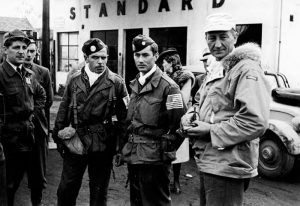Major William Colby led the OSS’s Norwegian Special Operations Group (NORSO) in guerrilla operations against German occupiers in the North Trøndelag region of central Norway from March 24, 1945, until the end of World War II. This is an excerpt from an attack that he led:
The two miles of track that looped from the old Norse village of Lurudal near the edge of Snåsa Lake was a key slice for the Germans’ freight trains barreling south on the Nordland line. Before he left England, Colby and his boss, Lieutenant Colonel Hans Skabo, had decided that cutting the track at multiple points gave the Wehrmacht practically as much a headache as blowing a bridge like Tangen’s thirty miles south because repair crews had to be sent to so many difficult-to-reach points to reconnect the line. With NORSO commando Borge Langeland and a Norwegian guide at his side, on Wednesday morning, April 25, Colby peered over a snowbank, his white parka camouflaging him, and gazed at the track snaking from Lurudal. The spring thaw, which brought mercifully higher temperatures, still ended up making the two-day ski trek to Lurudal for his twenty-five-man team a grind. With higher temperatures, skiing over the thirty-one miles of wetter snow became more laborious, while three lakes along their route to Lurudal had to be circumvented because their softened ice rendered travel over them with heavy-equipment pulks too hazardous.
Colby could see no Germans along the Lurudal track, but he knew many would descend on it quickly after the explosions. His intelligence reports told him forty Wehrmacht soldiers were garrisoned at Lurudal while the Plutten Tunnel and three other villages nearby had sixty more. The two thousand Germans at Snåsa farther south also could make it to Lurudal in ten minutes.

Major William Colby (third from left) is seen here battle hardened and gaunt, with a fellow commando and Norwegian officers after Norway’s liberation from German occupation. U.S. Army Photo
After sketching on a sheet of paper the points along the track that they would strike, Colby and his two comrades skied five miles back to the vacated hut at Skjorsjohaugen where his other men bivouacked. As the full moon appeared above the horizon that night, eight groups of three or four men each skied away from the hut at staggered times, so they all would arrive simultaneously at their designated spots along the two-mile stretch of track six miles away. Each team carried thirty rail charges. For his group, Colby had a Norwegian scout and NORSO Corporal Sivert Windh, a husky former Brooklyn waiter who hefted, in addition to his share of the explosives, a heavy Browning Automatic Rifle with extra ammunition.
The eight teams reached the edge of the track at 11: 30 p.m. The temperature had dropped to zero and a west wind howled through, but otherwise the night was silent. They had not been discovered. The men moved forward like a long chorus line to plant the charges—talking only in whispers as they placed a pair of explosives each at the alternating fishplates that bolted together the thirteen-yard-long rails. That way, each team could be sure that its thirty charges would tear up about two hundred yards of rail. They worked quickly—two men to strap the charges to the rail, the third to hook the firing system to the charges. Colby had instructed them before they set out that he would shoot a green flare into the air at precisely 11:45 p.m. to signal them to detonate the charges. If they didn’t see a flare they were under orders to start the explosions exactly five minutes later.
Every team finished on time except for one—Colby’s. A tunnel guardhouse that he hadn’t spotted with Germans inside stood just thirty yards from the northern tip of the section his group was blowing up. It had forced them to work slower so they didn’t alert the enemy soldiers and Colby never had time to shoot his flair. At 11:50 on the dot, explosions on the track quickly erupted one after another to a deafening crescendo as teams raced from one pair of charges to another firing them off individually.
Like bees whacked from a hive, the enemy for miles around fired aimlessly into the air and lit up the black sky with flares. Worried the guardhouse nearby would spill out with angry Germans, Colby ordered Windh to set up his BAR across the track to give them covering fire as he and his Norwegian guide ran along their section to spark the charges. It took only a couple minutes but as Colby pulled the last time-delayed detonator and started back, he saw to his horror that his Norwegian guide stood right next to the last rail that in ten seconds was about to be blasted.
He yelled at the guide, but the Norwegian, who spoke no English, looked at him bewildered. Colby ran to the man, lunged at him, knocking him down with Colby on top as the charge exploded, sending shards of steel over their heads.
Germans from the guardhouse opened fired. Most of their shots sprayed wildly. But one struck near, kicking up dirt and a pebble into Colby’s forehead. He and his two comrades hopped up and ran with all their might through the snow and away from the track.
With no trouble, the eight teams reached the assembly point Colby had designated after they finished their mission–another empty hut they broke into near Snåsa’s Skartnes farm. Quickly, they tabulated the damage. One hundred and nine of the double charges had successfully detonated destroying 218 rail sections, or about a mile and a half of the Nordland line. But they had no time to celebrate except for quickly gulping down cups of hot coffee to keep them awake. Colby and the others could hear the noise of enemy patrols closing in on them. Strapping on their skis they pushed out toward Lake Gjevsjøen thirty-five miles away.
They reached the base camp by four o’clock Thursday afternoon, never taking a break of more than a few minutes along the way. Colby saw no Luftwaffe spotter planes overheard as they made the trip while another snowstorm all but wiped out their tracks for the fifty Germans sent out to hunt them. But back at their hideout he posted extra guards at its perimeter and waited for an enemy response. The only one, however, came from a friendly Norwegian agent, who reported that a Wehrmacht officer had told him the terrorists who wrecked the line at Lurudal were “a very brave and resourceful group.”
